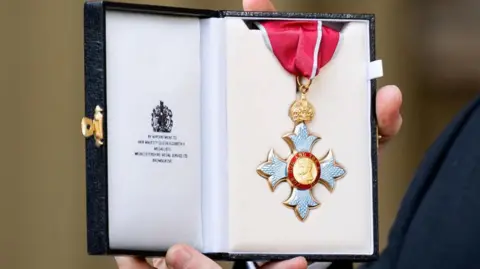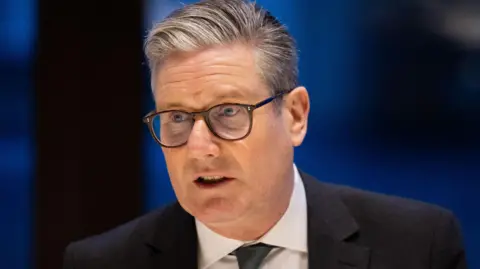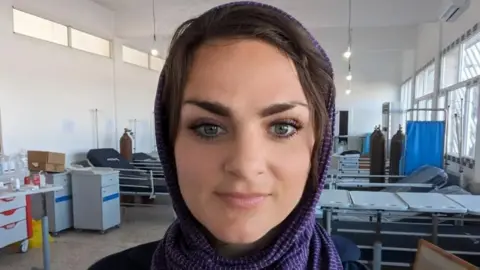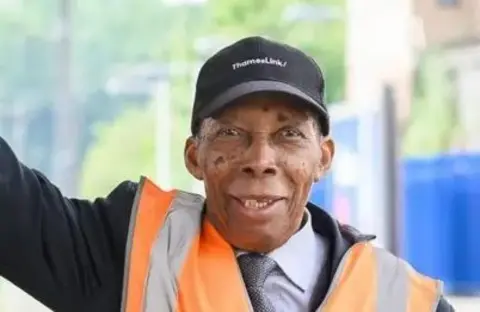[ad_1]
Sean Coughlan
Royal correspondent
Robert Cuffe
Head of knowledge, BBC Verify
 Getty Images
Getty Images
Higher honours, akin to CBEs and above, had few recipients within the north of England
In the most recent New Year Honours solely 6% of upper awards went to individuals within the north of England and solely 4% to individuals from working-class backgrounds, in keeping with a BBC evaluation of Cabinet Office information.
More than 60% of beneficiaries of “higher” awards, akin to Commander of the Order of the British Empire (CBE) and knighthoods and damehoods, lived in London and south-east England.
In response, the federal government says it’ll run occasions encouraging a a lot wider vary of nominations for honours, notably in communities and locations revealed to be under-represented.
“The prime minister has been clear that he wants to see representations from the length and breadth of the UK,” stated a authorities spokesman.
Sir Keir Starmer needs the honours system to replicate the “extraordinary contributions made across every part of this country”, the spokesman stated.
The prime minister, who units the strategic course for honours, needs them to be “awarded based on merit, regardless of background”.
 EPA
EPA
The PM needs honours to recognise individuals “across every part of this country”
The Cabinet Office’s information for the newest set of upper honours – for CBEs and above – present chief executives, professors and senior civil servants have been widespread recipients.
But the federal government needs to make sure that honours additionally attain “under-represented communities and would like to see further variety in the types of work rewarded”.
“Honours should not be automatic or assumed due to a job or position an individual holds,” says the federal government.
It plans outreach initiatives and public occasions, involving ministers, to encourage extra nominations from exterior London, to replicate the PM’s want for them to be “properly diverse and reflective of UK society”.
“We are getting on with the task by working in under-represented areas to raise awareness of the honours system and encourage more nominations,” stated a authorities spokesman.
The evaluation of these awarded the 142 most senior honours at New Year – CBEs, Order of the Bath, Companion of Honour, knighthoods and damehoods – reveals a big regional and social divide:
not a single particular person within the north-east of Englandacross the mixed areas of the north, north-east and north-west of England, and Yorkshire and the Humber, there have been solely 6% of recipients, despite the fact that it represents 23% of the UK’s populationthe West Midlands (8% of the inhabitants) acquired 3% of the awardsLondon and south-east England, which accounts for 27% of the UK’s inhabitants, was closely over-represented, with 61% of the upper awardsScotland and Wales had a share of honours just like their populations. Northern Ireland was under-represented4% of individuals granted high honours grew up in working-class familiesabout one in 50 individuals supplied an honour final 12 months turned it downthere was rather more range within the subsequent ranks of honours, akin to OBEs, MBEs and BEMs, with 64% exterior London and South East and 33% from working-class backgrounds
This 12 months’s New Year checklist was introduced as an opportunity to honour “unsung heroes and community champions” – however in apply the perceived extra prestigious awards appear to be focused on prosperous individuals from prosperous areas.
According to the Cabinet Office’s figures, solely 4% of recipients of “higher” awards had grown up in a “lower socio-economic” family – outlined as mother and father working in jobs akin to supply driver, postal employee, safety guard and retail employees – accounting for nearly 40% of the workforce.
“It’s deeply unfair. It’s not based on merit; it’s based on the top-down nature of society. It needs to change and it’s out of date,” says Norman Baker, former Home Office minister and critic of the honours system.

Anna Daniell stated her Humanitarian Medal additionally recognised the work of her colleagues
There can also be a two-tier method to the system of honours awarded to totally different social teams, he argues. As properly because the 142 “higher” awards at New Year, there have been greater than 1,000 Officers of the British Empire (OBEs), Members of the British Empire (MBEs) and British Empire Medals.
“If you’re a senior civil servant you’ll end up with a top honour. If you’re a lollipop lady who works for 60 years in the freezing cold outside a school, you might get an MBE if you’re lucky,” stated Mr Baker.
Private Eye journal lately highlighted that whereas a bunch of sub-postmasters wronged within the Post Office scandal turned OBEs, a senior lawyer from the agency that represented the Post Office had the upper award of CBE. That was described on X as “totally shocking” by Kevin Hollinrake, shadow secretary for levelling up, housing and communities.
“It’s time for a system shake-up,” says Rosie Lockwood of the IPPR North suppose tank. “The honours system is yet another example of how the establishment in this country overlooks people in regions like the North.”
Transparency International UK, which campaigns towards corruption in public life, says it ought to be clear who nominated the recipients of honours. Is it from authorities departments or companies searching for awards for their very own senior employees? How many are actually nominated by the general public or group teams?
“It won’t help to build confidence and trust in the honours system if there’s a perception that the proximity to the seat of power and personal wealth significantly increases your chance of getting a gong,” stated the group’s chief govt, Daniel Bruce.

Siggy Cragwell was awarded a British Empire Medal, recognising 62 years engaged on the railways
There have additionally been makes an attempt to make honours extra consultant – with the general public invited to submit nominations.
There is a more-or-less even gender cut up among the many honours and throughout the entire vary of honours, 12% have been awarded to individuals from ethnic minorities, in contrast with 6% a decade in the past.
The vary of honours out there can also be broader now – the recipients of the primary Humanitarian Medals have simply been introduced.
Winners have spoken in regards to the large optimistic influence of such awards, not only for themselves however for recognising the efforts of colleagues, too.
Anna Daniell, primarily based in Manchester, was among the many first group of Humanitarian Medal winners final week. She was recognised for her medical help serving to survivors of the lethal floods in Libya in 2023.
She stated it was an “amazing surprise” to obtain a medal, however it was additionally actually vital for the way it “highlights the importance of humanitarian aid”.
Amanda Chadwick, from Manchester, stated being made an MBE had modified her life, because it raised consciousness of her kids’s charity and helped her to achieve extra individuals.
Railway employee Siggy Cragwell, initially from Barbados, stated he’d proudly worn his British Empire Medal awarded to him on the age of 85 final 12 months in recognition of 62 years of engaged on the railways. He’d been a visitor of honour on the unveiling of the Windrush monument at London’s Waterloo Station.
But there have additionally been questions on modernising the titles of medals, notably about the usage of “Empire”. Poet Benjamin Zephaniah turned down an OBE over its associations with colonialism.
The Cabinet Office says “about 2% of people refuse to accept honours” however did not give the explanations.
“Individuals decline honours for a variety of reasons and we respect their personal decision to do so,” stated a Cabinet Office spokesman.
More than 20 years in the past, the House of Commons public administration choose committee referred to as for a transfer away from the time period “empire”, a proposal that was subsequently rejected by the then UK authorities.
Additional reporting Avi Holden and David Ainslie

[ad_2]



